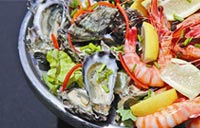Crustacean sensation
|
Canadian lobsters have big claws. Ye Jun / China Daily |
 |
| A shell of a good meal |
 |
| China's famous baozi |
"Because these lobsters are grown in cold water, they are firm, sweet and they have a lot of flavor," says Andrew Maharaj, trade commissioner with the Canadian embassy.
Maharaj says the lobster is grown naturally in cold water, so it is the kind of safe food product Chinese people are looking for.
Embassy chef Ethan Robinson says boiling is the most common way to cook the crustacean. Then it is served with a cracker, a fork, lemon and melted butter. He usually boils a lobster for 10 minutes. "I usually boil it whole in the shell, because the shell has a lot of flavor," he says.
Lobster can also be taken apart and prepared into pate or terrine. It is also often made into a bisque.
"Even in Canada, it is a luxury," the Canadian chef says. "Depending on where you get it and the time of the year, it costs from 10 to 30 Canadian dollars (about $9 to $26) a kilo."
Chinese chefs make lobster in many different ways, according to Ye Yunhui, executive chef with Tang Palace. Unlike Western cuisine, in which chefs often put lobster in a cold salad, Chinese usually prefer eating it hot.
One way to serve lobster cold is to boil it and serve it on ice, with sauce. It can also be braised with black pepper, or black truffle. Or, it can also be split in two and steamed with mashed garlic.
Ye also likes to split a lobster in two and deep-fry it. Lobster meat can be fried with green or red bell peppers. The big claw can be sauteed and served alone. The shell and claws can be boiled in congee.
In many Cantonese restaurants, expensive lobster used to be prepared in three ways. An Australian lobster can be prepared into sashimi. The shell with some meat on it can be deep-fried. Other parts of the shell can be used in congee.
A popular lobster dish at Tang Palace, Ye says, is lobster soup with crispy white rice.
With a recent government crackdown on waste and spending of public funds, China's high-end restaurants are looking to cut their prices and cater to a wider range of customers.
He Jianmei, general manager of Beijing area, insists Tang Palace has always offered affordable lobsters. But she admits the move is consistent with the trend to be more affordable. She says the restaurant hopes more people will notice it offers plenty of reasonably priced, high-quality foods.
Tang Palace makes Beijing's best roast pigeon. It serves a lot of other seafood and a tasty array of dim sum.
IF YOU GO
Tang Palace No 1 branch, 1/F Jianguo Garden Hotel, 17 Jianguomennei Dajie (Street), Dongcheng district, Beijing. 010-6513-1288.
Average spending per head: 120 yuan ($20).
Recommended: Lobster Soup with Crispy Rice, Braised Lobster with Black Truffle, Steamed Lobster with Mashed Garlic or White Wine.

















